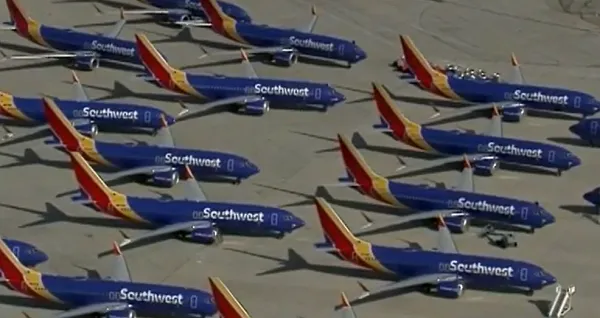
Boeing reverses stance on MAX simulator training
Jan 07, 2020

Boeing has shifted its position regarding simulator training for the 737 MAX, now advocating for additional simulator requirements for pilots. This change comes in response to ongoing safety concerns and regulatory scrutiny following two tragic crashes involving the aircraft. Previously, Boeing had argued that simulator training was unnecessary for pilots transitioning from earlier models, but the company now acknowledges the importance of comprehensive training to ensure pilot proficiency and safety. This decision reflects Boeing's commitment to enhancing safety measures and restoring confidence in the 737 MAX as it navigates a challenging recovery period in the aviation industry.
The aviation industry has witnessed a significant shift in training protocols following Boeing's recent decision to reverse its stance on MAX simulator training. This move comes after ongoing discussions with regulators and stakeholders about enhancing safety measures and improving pilot training for the 737 MAX series. With safety at the forefront, Boeing's updated approach could reshape how pilots are trained to operate this aircraft.
Background on the 737 MAX
The Boeing 737 MAX faced scrutiny after two tragic accidents that led to its grounding in 2019. The incidents raised questions about pilot training and the aircraft's automated systems. Initially, Boeing had maintained that simulator training was not necessary for pilots transitioning to the MAX from earlier 737 models. However, as safety regulations evolved, so did Boeing’s perspective.
Why the Change in Training Protocol?
Boeing's decision to implement simulator training for the 737 MAX reflects a broader commitment to safety and regulatory compliance. The Federal Aviation Administration (FAA) and global aviation authorities emphasized that comprehensive training is crucial for ensuring pilots are fully prepared to manage the aircraft's advanced systems.
By introducing mandatory simulator training, Boeing aims to address concerns raised by pilots and airline operators who believe that hands-on experience in a simulated environment is essential for mastering the aircraft's unique features.
Benefits of Simulator Training
Simulator training offers several key advantages for pilot education:
| Benefits | Description |
|---|---|
| Realistic Scenarios | Simulators can replicate various flight conditions and emergencies, providing pilots with practical experience without the risks associated with real flights. |
| Cost-Effectiveness | Training on simulators is generally more cost-effective than actual flight training, allowing airlines to allocate resources efficiently. |
| Immediate Feedback | Instructors can provide real-time feedback during simulator sessions, enhancing learning and retention for pilots. |
| Flexible Scheduling | Simulators can be accessed more easily than aircraft, allowing for more flexible and frequent training sessions. |
Industry Reactions
The aviation community has largely welcomed Boeing's decision to reverse its stance on simulator training. Airline pilots and unions have expressed approval, noting that comprehensive training is crucial for ensuring the highest safety standards. Many pilots have advocated for enhanced training protocols, emphasizing that simulator experience is invaluable for navigating the complexities of modern aircraft.
Airlines are also supportive of this change, as it aligns with their commitment to safety and operational excellence. By ensuring that pilots undergo rigorous simulator training, airlines can reduce the likelihood of incidents, thereby promoting passenger confidence and trust in air travel.
Regulatory Implications
As Boeing implements these changes, regulatory bodies such as the FAA are likely to monitor the effectiveness of the new training protocols closely. This scrutiny will ensure that the training meets the required safety standards. Additionally, Boeing's decision may influence other aircraft manufacturers to reevaluate their training requirements, leading to a more uniform approach across the industry.
Future of Pilot Training in Aviation
Boeing’s reversal on the necessity of simulator training for the 737 MAX may set a precedent for future pilot training protocols. As the industry evolves, there is a growing recognition that traditional training methods must adapt to include modern technologies and practices.
Advancements in simulator technology, such as virtual reality (VR) and augmented reality (AR), could further enhance the pilot training experience. These technologies can provide even more immersive and realistic training scenarios, allowing pilots to refine their skills in a controlled environment.
Conclusion
Boeing's decision to reverse its stance on MAX simulator training underscores a significant shift in the aviation industry towards prioritizing safety and effective pilot training. By implementing mandatory simulator training, Boeing aligns its practices with the expectations of regulators, pilots, and airlines. This change not only enhances safety but also paves the way for a more robust training framework that can adapt to future technological advancements.
As the industry continues to evolve, it is essential for manufacturers and airlines to work together to ensure that safety remains the top priority. Boeing's commitment to improving pilot training through simulators serves as a vital step in restoring confidence in the 737 MAX and the broader aviation sector.
Related Articles

Explore Thailand: The Best Islands to Visit for Paradise, Adventure, and Relaxation

The Ultimate Guide to the Best Islands in Thailand for Your Next Getaway

Do babies need passports? How to get a passport for a newborn

How to get a U.S. passport fast: here’s how to expedite the process

What is Mobile Passport Control: 5 reasons why you should use it

SENTRI vs. Global Entry: A detailed guide

Do you need a passport to go to the Bahamas? Let’s find out

Do you need a passport to go to Mexico? A detailed guide

Do you need a passport to go to Canada? We got the answer

Do You Need a Passport for a Cruise: An Essential Travel Guide

Booster Seat Requirements: All the Rules to Follow in Your Rental Car

What Are the World’s Most Powerful Passports, and How Does Yours Rank?

How to Take a Passport Photo at Home: A Helpful Guide

You've got to have heart! Southwest's new livery

Your opinion: Should water be free on low cost carriers?

Young women bolder than guys as solo travellers
